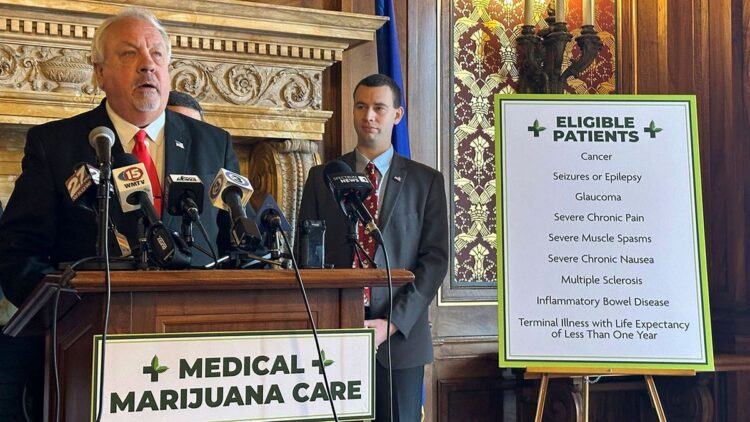- In Wisconsin, Republican legislators have introduced a bill to permit medical marijuana, aligning with the recent support from Democratic Governor Tony Evers.
- This bill would specifically allow medical marijuana for those with serious illnesses, including chronic diseases like cancer.
- Robin Vos, the Republican Assembly Speaker, indicated that this proposal is the furthest extent of what they are prepared to support.
On Monday, Wisconsin’s Republican lawmakers revealed a tightly regulated initiative to authorize medical marijuana. This announcement came shortly after Governor Evers, a Democrat, endorsed the concept.
The legislation would restrict medical marijuana access to individuals with severe chronic conditions, such as cancer. While this falls short of the complete legalization that Democrats and Governor Evers have long sought, Evers expressed support for establishing a medical marijuana program as a preliminary step.
According to Robin Vos, the Republican Assembly Speaker, the proposed bill, unveiled on Monday, represents the maximum level of legalization acceptable to Assembly Republicans. The Republicans currently have a majority in both the Assembly and the Senate. Senate Majority Leader Devin LeMahieu, a Republican, previously stated that a medical marijuana bill with strict regulations could pass in this legislative session.
The proposal introduced on Monday would allow medical marijuana for patients diagnosed with specific conditions, including cancer, glaucoma, multiple sclerosis, and others, as well as for those terminally ill with less than one year to live.
Republican Representative Jon Plumer announces the GOP’s medical marijuana legalization plan in Wisconsin at a Capitol press conference on Jan. 8, 2024, in Madison, Wis. The plan introduced by Wisconsin Republicans is notably restrictive. (AP Photo/Scott Bauer)
Under the bill, patients would need a physician’s diagnosis to obtain marijuana from one of the few state-operated dispensaries, as stated by Republican Rep. Jon Plumer.
“Our goal is to make this accessible to those in need, but under strict regulation,” added Plumer.
Neighboring states such as Minnesota, Illinois, and Michigan have legalized recreational marijuana.
Vos mentioned that this bill is similar to Minnesota’s initial medical marijuana laws before they opted for full legalization.
For the bill to become law, it must pass both the Assembly and Senate and receive Governor Evers’ signature.
Governor Evers and Senate Majority Leader LeMahieu have not commented on the bill.
Notably, Assembly Republicans developed their plan without collaborating with Senator Mary Felzkowski, a prominent advocate for medical marijuana in the Senate. Her bill in 2022 was the only one to receive a public hearing in the Legislature.
Although Evers supports the idea of medical marijuana, he mentioned he had not reviewed a specific bill yet.
“I would prefer a comprehensive approach to address the needs of Wisconsinites who have requested it,” Evers commented. “But if this is what’s achievable now, I’m in favor.”
Wisconsin stands apart nationally, with 38 states having legalized medical marijuana and 24 states approving recreational use. The push for legalization in Wisconsin has intensified as neighboring states have relaxed their marijuana laws.
Surveys by Marquette University Law School consistently show that a significant majority of Wisconsin residents support legalizing marijuana.
OTHER NEWS: Exploring the Benefits of Cannabis for Wellness and Health
Exploring the Link Between Cannabis Use and Mental Health









